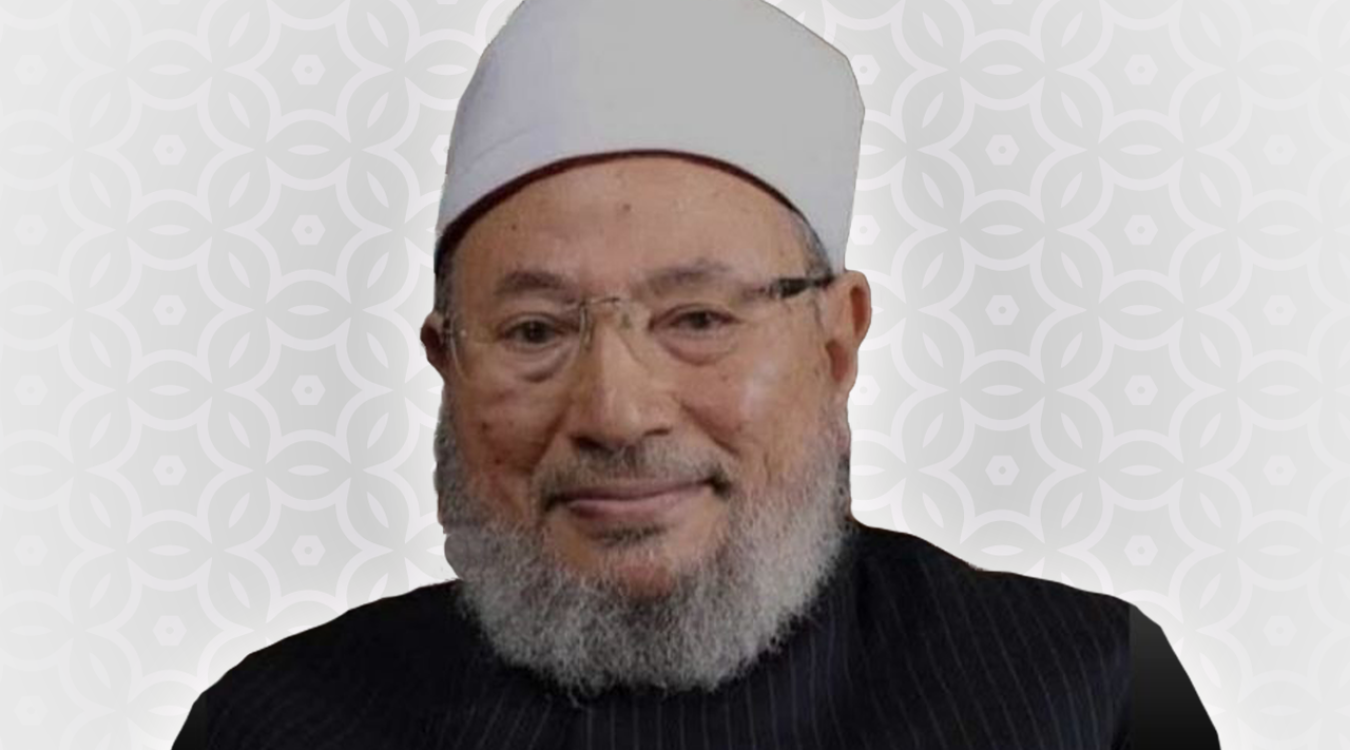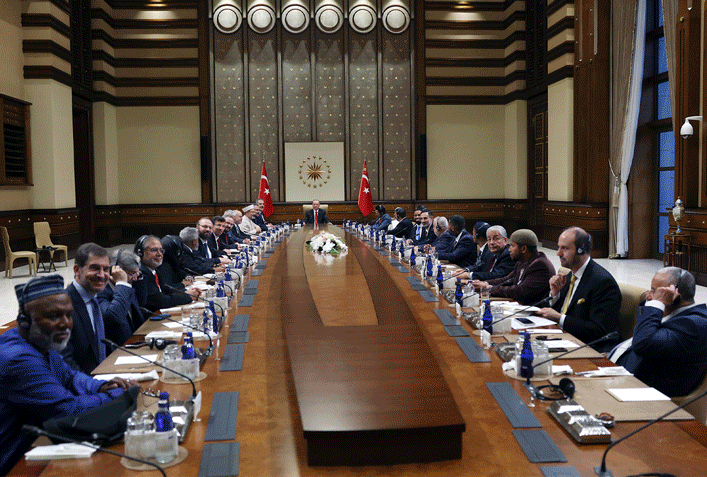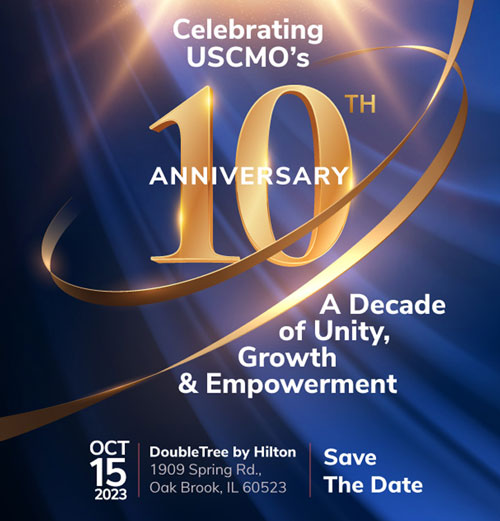So give glad tidings of everlasting delight in Paradise
to those who are enduringly patient –
those who when an affliction strikes them, say:
Indeed, to God do we belong, and, indeed, to Him are we returning.
—The Quran, 2:156
(WASHINGTON, DC – 9/26/2022) The US Council of Muslim Organizations, on behalf of our member institutions and American Muslims, give condolences to the global Muslim community on the passing today of Shaykh Yusuf Al-Qaradawi, 96 – to many the most prominent and consequential scholar of Islam of our time – and we offer our special sympathies to his wife, children, and family.
Shaykh Yusuf rose from humble birth – on 9 September 1926 in Egypt’s Nile Delta village, Saft Turab, orphaned at birth by the preceding death of his father and becoming a “double orphan” a year later with the passing of his mother – to become inarguably one of the most influential Islamic scholars (some say the Renewer (Al-Mujaddid) of Islam) of the last century.
He memorized the Quran before he was 10 (later he became known for his prodigious recall capacity, remembering the names and faces of people he met once years after) and enrolled in the renowned religious center of Islamic learning, Al-Azhar University, after completing secondary education, obtaining an undergraduate degree in 1953 from its Faculty of Usul Al-Din, Principal Sources of the Religion of Islam.
Just one year later, he earned a graduate degree from Al-Azhar University’s prestigious Faculty of Arabic Language, graduating first in his class. He joined Egypt’s Ministry of Awqaf (Religious Endowments) in the Institute of Imams department, working under the renowned Islamic scholar and public intellectual Shaykh Mohammed Al-Ghazali, and later at Al-Azhar’s Department of Islamic Culture.
Under Al-Ghazali’s tutelage, Shaykh Yusuf began what would become an incredibly prolific life as a writer and public Islamic scholar, authoring more than 50 books and countless articles, for the most part aimed at helping Muslims in the contemporary context live and under Islam and current issues within the guidelines of the Shari‘ah, according to the Quran; the practices, instructions, and approvals of the Prophet, on him be peace; and drawing on the considerable treasury of 14 centuries of Islamic scholarly explanation and comment.
As a teen, Hasan Al-Banna, the charismatic founder of Egypt’s Muslim Brotherhood (in 1928), gave a public talk at Shaykh Yusuf’s school that he later described as “brilliantly illuminating … as if it were still-living embers of the prophetic light.” He joined him in his mission of reestablishing Islam in its worship and transactions in the hearts and lives of Muslims and Muslim society, and re-envisioning the political integration of the Muslim Ummah, or global community, free of settler colonial presence or imperial hegemonic influence in Muslim lands.
This started the state persecution of Shaykh Yusuf – imprisoned in 1949 by the Egyptian monarchy of King Farouk, and then three times by the military junta of Gamal Abdel Nasser and the Young Officers that overthrew the monarchy in 1952 – a persecution that persisted for him throughout his life and continues for his family members till today.
In 1960, Shaykh Yusuf published perhaps his best-known popular book Al-Halal wa’l-Haram fi’l-Islam, The Lawful and the Prohibited in Islam, published in virtually every major language on earth where Muslims live.
In 1961, Al-Azhar sent Shaykh Yusuf to the State of Qatar, as part of an exchange of scholars, as the head of Qatar’s Religious Institute. There he remained, establishing the University of Qatar’s Department of Islamic Research in 1973, and earning his Takhassus min Darajat Ustadh, Specialty at the Level of Professor (today, Ph.D.) from Al-Azhar in the same year, his dissertation entitled Zakat and Its Efficacy in the Resolution of Social Problems, which, six years later, under his thorough revision, became his magisterial Fiqh az-Zakat, one of the most important works of Islamic Law in our time. A decade later, in 1989, Shaykh Yusuf founded Qatar University’s Research Center of Sunnah and Sira (Prophetic Traditions and Biography), continuing as its director until his passing.
Internationally, Shaykh Yusuf established and headed in 1997 an assembly of Islamic scholars, the European Council on Fatwa and Research, headquartered in receptive Ireland, in Dublin, when Arab countries refused to permit its establishment. It is dedicated to answering the questions and addressing the issues that help Muslims understand and live in accordance with the Shari‘ah in the social and economic contexts of contemporary life.
He followed this in 2002 with (for the same legal reason) the Dublin-based establishment of the International Union of Muslim Scholars, the organization that issued the important international Islamic legal ruling nullifying, voiding, and vindicating Muslims of “Daesh,” or the unilateral declaration of the caliphate of the Islamic State of Iraq and the Levant, also disqualifying its founders as “unfit” by Islam to make such a declaration or to assume any such positions.
While Shaykh Yusuf is among the most widely read and known Muslim scholars in the world by ordinary Muslims, his weekly television show via Al Jazeera, the Arab satellite station, Al-Shari‘ah Wa’l-Haya, “The Divine Law of Islam and Life” – an interactive program where Muslims could call in and pose questions to him or seek his guidance – rocketed his global celebrity and esteem among Muslims exponentially, garnering him at least 40 million viewers a week.
Shaykh Yusuf has been known for his rigorous and consistent condemnation of extremist groups and responses within the Muslim community, while taking a strong stand for the rights of the Muslim oppressed, highlighting the lethal persecution and dispossession of the Palestinians, and the sacred obligation of the Muslim community regarding Al-Aqsa Mosque and its divinely blessed surroundings.
He stood staunch against Muslim sectarianism and especially the proliferation of the inter-colonialist aspirations of political entities in the Muslim world that subordinate Islam’s equal justice to the biases of doctrine and denomination.
Shaykh Yusuf’s name and work have become synonymous with Islamic Law in the minds of most Muslims. He has said, however, that his scholarly specialization is in the Quran and its commentary (tafsir) and that he began his writings on matters of Islamic Law as a kind of personal side interest. Attentive readers of his work can readily see the strong underlayment of knowledge of the Quran and the Sunnah of the Prophet, on him be peace, as foundational in all his work.
We condole ourselves, the global Muslim community, and all the seekers of divine knowledge and prophetic practice on our great loss of Shaykh Yusuf Al-Qaradawi.
O Allah! Purify his soul as a white cloth is purified from grime. Cleanse him with water, ice, and snow. Push the earth from his sides. Make spacious his grave. Fill it with Your Light. Make it a patch of Paradise and let him see his place in it, until you reknit his soul in his body and raise him up on the Day of Resurrection, with those upon whom You have bestowed Your grace – among the prophets, the truthful, the martyrs, and the righteous.
O Allah! Bless his family and this Ummah of Muhammad, on him be peace, that he loved and served and do not dispossess us of his bounty after him, and do not deprive us of his wisdom, learning, guidance, and courage. Rather, raise up from us sincere scholars to whom you grant great knowledge, wisdom in teaching it, and bravery in living by and publicly imparting it.
O Allah! Amin, and send Your peace and blessings upon our master and our Prophet Muhammad, his family, his Companions, his wives, his nation, and each one who follows him until the Day of Debt, the Day of Religion, Hereafter.
###






